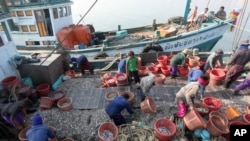A US court has ruled in favor of US and Thai seafood companies in a complaint by Cambodian laborers. The decision is a setback for the victims and rights advocates who had high hopes for a favorable resolution to the case.
The District Court in Central California ruled that there was not sufficient evidence to show that US-based Rubicon Resources and Wales & Co. Universe Ltd., and Thai companies Phathana Seafood and S.S Frozen Food had benefited from human trafficking and forced labor or even had any knowledge of such practices in their supply chains.
In a ruling on January 4, Judge John F. Walter decided that the complainants “take nothing by way of their complaint,” and that the “final judgment shall be entered in favor of defendants Phatthana, SSF, Rubicon, and Wales.”
“Plaintiffs have failed to demonstrate that Rubicon or Wales knew or should have known that human trafficking existed at Phatthana’s Songkla factory,” Judge Walter ruled.
Keo Ratha, a victim of alleged forced labor and one of the seven complainants, expressed his “deep regret” at the decision.
“I’m disappointed because we thought that the US court would find justice for us,” Ratha told VOA Khmer last week. “But when the court dismissed our complaint I was speechless. This is their law.”
Keo Ratha and six other victims – Seam Kosal and his wife Bun Sophea, Yem Ban and his wife, Nol Nakry, Sok Sang, and Phan Sophea – filed a lawsuit on June 15, 2016, against all four seafood manufacturers, accusing them of human trafficking, involuntary servitude, and forced labor.
The complaint was filed under the Trafficking Victims Protection Reauthorization Act (TVPRA), which allows victims to file a complaint against a US company if it is involved in or benefitted from human trafficking activity, even though it takes place outside the United States.
Rubicon Resources and Wales are American companies. Phatthana Seafood Co. Ltd and S.S. Frozen Food are Thai seafood companies and have a shrimp factory in Songkhla province in southern Thailand. Phatthana supplied shrimp products to Rubicon Resources for sale to retailers in the United States, including Walmart. Wales is a quality inspector for Rubicon Resources.
The seven victims were lured by a local recruitment agency to work at Phatthana and S.S. Frozen Food between 2010 and 2012. The victims loaned money to fund their travel and remain in debt as a result. They have complained of health problems due to difficult working conditions and poor living conditions.
“We are obviously disappointed in the court’s decision,” Agnieszka Fryszman, a lawyer for the complainants, wrote in an email.
Fryszman explained that the defendants declined to seek summary judgment on the trafficking claims of the majority of the plaintiffs, which meant that they conceded that there was sufficient evidence of peonage, forced labor and human trafficking to proceed to trial.
“We believe the court’s decision that the claims could not be heard in the United States is wrong on the law,” she said.
In order to more effectively combat human trafficking in global supply chains, the United States enacted and expanded the Trafficking Victims Protection Act to permit victims to bring suits in U.S. district courts and to ensure accountability over the entire trafficking chain.
“As a result, the TVPRA expressly imposes liability on those who financially benefit from trafficking, forced labor, or peonage in overseas supply chains,” Fryszman said. “We believe this case falls squarely within the statute’s protections.”
Labor rights activist Dy Thehoya of the Center for Alliance of Labor and Human Rights said this is a case in point where victims are not familiar with the court systems and need support from the authorities.
“They are simply ordinary fisherpeople so they have difficulties in reaching out to the legal system,” Thehoya said. “The Cambodian and US governments should help them to ensure that justice is served.”
VOA reached out to the defendants’ attorney at Sheppard, Mullin, Richer & Hampton, but did not receive a response.
In defense documents, the team argued that the US-based companies, Rubicon and Wales, never received any benefits from forced labor while the plaintiffs worked at Phatthana's factory in Songkhla province.
The defense team argued that Patthana was not involved in human trafficking because the company did not directly recruit workers and had only legal duties to assist in filing for a work permit for them. The victims decided to enter Thailand illegally without a passport, which prevented them from traveling freely in Thailand or changing jobs for fear of arrest by Thai authorities.
“These consequences cannot be blamed on Phatthana,” said the lawyer’s statement.
The victims have appealed the case but have little hope their appeal will be heard.
“It’s hard to hope for a victory because we don’t know if the Courts of Appeal will seriously consider our complaint,” said Ratha. “If they dismiss our case again, we are hopeless. We will be doubly victimized by this.”







